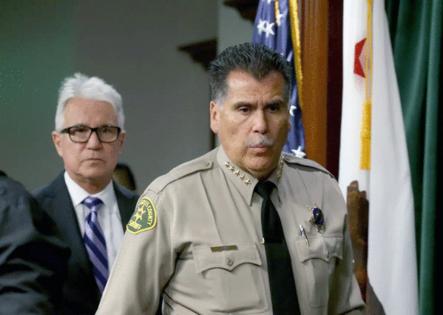Law enforcement groups oppose proposed anti-drug program cuts
Published in Political News
WASHINGTON — Law enforcement agencies and associations are pushing for Congress to reject a Trump administration proposal to cut funding for a program aimed at reducing drug trafficking and illicit drug production, as well as change where it is run in the government.
The Trump administration’s fiscal 2026 budget request proposes to move the High Intensity Drug Trafficking Areas program from the Office of National Drug Control Policy to the Justice Department, while also cutting its funding by about 34%.
The program coordinates federal, state and local law enforcement agencies and has led to the dismantling of violent drug trafficking organizations, authorities said.
The move comes amid a larger push from the Trump administration to reshape the Justice Department’s structure, including one budget proposal to consolidate entities into Office of Justice Programs. The administration’s budget proposes to transfer the management of the HIDTA program to the Office of Justice Programs.
But the funding cut and transfer plan are running into pushback from authorities and law enforcement groups who say the move would hurt the president’s public safety goals amid threats, such as cartel-driven drug trafficking.
Sean Case, police chief of the Anchorage Police Department, argued the current framework gives state and local leaders an equal say in coming up with public safety strategies.
“I cannot express how important it is for Congress to preserve ONDCP’s authority over HIDTA and fully fund the HIDTA program,” he wrote in a letter.
And Los Angeles County Sheriff Robert Luna, in a separate letter, wrote that the relocation proposal and the funding cut would threaten operational flexibility.
“It risks replacing proven, locally informed strategies with a more centralized, less responsive framework that may not reflect the on-the-ground realities of each region,” Luna wrote.
House Republicans have fiercely supported Trump. But the line item will be an indicator in how much deference House GOP appropriators will afford to the Trump administration’s plan to overhaul the Justice Department.
A White House budget document states the plan was proposed to “improve coordination with the Department’s other drug enforcement efforts.”
The Trump administration, during his first term in office, proposed transferring the HIDTA program to the Drug Enforcement Administration in its fiscal 2019 budget request, but the plan was not approved by Congress.
Law enforcement groups are asking lawmakers to leave the program where it’s at in the Office of National Drug Control Policy. The current framework allows local agencies to come up with responses to evolving drug threats, but that flexibility could disappear under a more centralized Justice Department model, they argue.
National law enforcement groups are also raising red flags. A cohort of groups, which included the Major County Sheriffs of America and the National Narcotic Officers’ Associations’ Coalition, said in a joint letter that the drug control policy office provides neutral oversight.
“Unlike individual enforcement agencies, ONDCP does not promote a single department’s interests — its sole focus is on effective coordination and strategy,” the groups said. “Housing HIDTA within ONDCP ensures a balanced, coordinated response to drug threats and protects the integrity of its multi-agency structure.”
The office of Sen. Roger Marshall, R-Kan., in a news release, said the lawmaker has asked the Senate Appropriations Committee to “fully fund” the HIDTA program.
“The HIDTA program effectively utilizes local, state and federal resources to help law enforcement agencies better understand and combat threats and criminal activity in their communities,” Marshall said.
Senators brought up the proposed transfer at an Appropriations subcommittee meeting last week with Attorney General Pamela Bondi.
Sen. Deb Fischer, R-Neb., said she’s heard from local law enforcement in her state who fear that the proposal could hinder the program’s ability to fight drug trafficking.
“Our law enforcement in Nebraska uses those grants, again, in a really responsible way and they’re very, very effective across the state,” Fischer said.
After Sen. Shelley Moore Capito, R-W.Va., inquired about the transfer, Bondi mentioned the proposed funding level, but left out that the proposal would cut funding by about 34%.
“I will do everything in my power to be sure that those areas and those local law enforcement officers are funded,” Bondi said.
©2025 CQ-Roll Call, Inc., All Rights Reserved. Visit cqrollcall.com. Distributed by Tribune Content Agency, LLC.

























































Comments